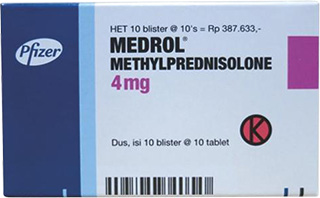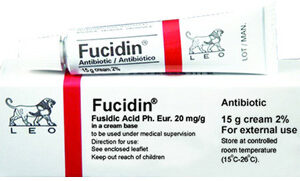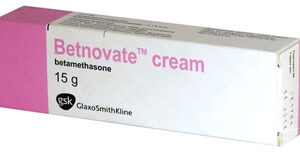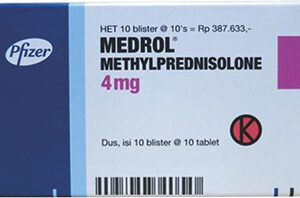Medrol Generic and Brand Names
Medrol is the brand name for the generic medication methylprednisolone, a corticosteroid used to suppress the immune system and reduce inflammation.
Medrol Dosage Forms
Medrol is available in tablet form in doses of 2 mg, 4 mg, 8 mg, 16 mg, and 32 mg. Injectable forms and a Medrol Dosepak (21 tablets of 4 mg) are also available.
Pharmacological Class
Methylprednisolone belongs to the class of drugs known as glucocorticoids, which are a type of corticosteroid.
Indications for Use
Medrol is indicated for a variety of conditions such as allergic states, dermatologic diseases, endocrine disorders, gastrointestinal diseases, hematologic disorders, neoplastic diseases, nervous system conditions, ophthalmic diseases, renal diseases, respiratory diseases, and rheumatic disorders.
Medrol Mechanism of Action
Methylprednisolone acts by suppressing inflammation and the normal immune response through a decrease in the activity of the immune system and inhibition of inflammatory mediators.
Recommended Dosage and Administration
Dosage should be individualized based on the condition being treated and the patient’s response. It may vary from 4 mg to 48 mg of methylprednisolone per day. The Medrol dose pack is commonly prescribed for short-term treatment, following a step-down dosing regimen over a 6-day period.
Adjustments for Renal and Hepatic Impairment
In cases of renal and hepatic impairment, methylprednisolone may require dosage adjustments and close monitoring due to potential altered metabolism and excretion.
Drug Interactions
Medrol may interact with other medications such as CYP3A4 inhibitors and inducers, warfarin, aspirin, antidiabetic drugs, cyclosporine, and vaccines. Consultation with a healthcare provider is crucial for the management of potential drug interactions.
Side Effects and Adverse Reactions
Common side effects include fluid retention, alteration in glucose tolerance, increased blood pressure, behavioral and mood changes, increased appetite and weight gain. Serious adverse reactions involve cardiovascular, musculoskeletal, gastrointestinal, dermatologic, neurological, endocrine, and ophthalmic systems.
Monitoring Parameters
Monitoring should include blood pressure, blood glucose levels, intraocular pressure for patients on prolonged therapy, and for those with a history of cardiac, renal, or hepatic failure. Complete blood counts and electrolyte levels should also be assessed periodically.
Instructions for Use and Handling
Tablets should be taken orally with food or milk to prevent gastrointestinal upset. It is recommended that Medrol be taken in the morning to coincide with the body’s natural cortisol cycle. The medication must be stored at room temperature and protected from light.
Special Dietary Considerations
Patients may need to moderate their salt intake to manage fluid retention and maintain adequate potassium intake while on therapy. Healthcare professionals may recommend a diet low in carbohydrates and high in protein to counteract potential metabolic effects.
Dosing Adjustments During Stress
In the event of stress or a medical emergency, doses of Medrol may need to be increased due to the body’s higher demand for steroids, and the risk of adrenal insufficiency.
Handling Missed Doses
If a dose is missed and it’s closer to the time of the next dose, patients should skip the missed dose and resume their regular dosing schedule. Doubling up doses to compensate for missed doses is not advised.
Discontinuation of Medrol
Gradual dose tapering is essential when discontinuing Medrol, especially if taken for a prolonged period. Abrupt discontinuation after extended use can lead to steroid withdrawal and adrenal crisis.
Pregnancy and Lactation Considerations
Corticosteroids like Medrol can cross the placenta and may cause harm to a fetus. These drugs should be used during pregnancy only if the potential benefit justifies the potential risk. Corticosteroids pass into breast milk, so caution is advised when administering Medrol to nursing mothers.







Reviews
There are no reviews yet.